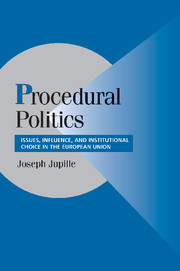Book contents
- Frontmatter
- Contents
- List of Figures
- List of Tables
- Preface and Acknowledgments
- List of Acronyms Used in the Text
- 1 INTRODUCTION: CHOICE, CONSTRAINT, AND EUROPEAN UNION INSTITUTIONS
- 2 THEORIZING PROCEDURAL POLITICS: ISSUES, INFLUENCE, AND INSTITUTIONAL CHOICE
- 3 THE EUROPEAN UNION AS A PROCEDURAL SYSTEM: RULES, PREFERENCES, AND STRATEGIC INTERACTION
- 4 PATTERNS: DETERMINANTS AND EFFECTS OF EU PROCEDURAL POLITICS
- 5 GREENING THE MARKET? PROCEDURAL POLITICS AND EU ENVIRONMENTAL POLICY
- 6 MAD COWS AND ENGLISHMEN: PROCEDURAL POLITICS AND EU AGRICULTURAL POLICY
- 7 CONCLUSION: PROCEDURAL POLITICS AND RULE GOVERNANCE IN THE EUROPEAN UNION AND BEYOND
- Bibliography
- Index
- Cambridge Cultural Social Studies
5 - GREENING THE MARKET? PROCEDURAL POLITICS AND EU ENVIRONMENTAL POLICY
Published online by Cambridge University Press: 24 July 2009
- Frontmatter
- Contents
- List of Figures
- List of Tables
- Preface and Acknowledgments
- List of Acronyms Used in the Text
- 1 INTRODUCTION: CHOICE, CONSTRAINT, AND EUROPEAN UNION INSTITUTIONS
- 2 THEORIZING PROCEDURAL POLITICS: ISSUES, INFLUENCE, AND INSTITUTIONAL CHOICE
- 3 THE EUROPEAN UNION AS A PROCEDURAL SYSTEM: RULES, PREFERENCES, AND STRATEGIC INTERACTION
- 4 PATTERNS: DETERMINANTS AND EFFECTS OF EU PROCEDURAL POLITICS
- 5 GREENING THE MARKET? PROCEDURAL POLITICS AND EU ENVIRONMENTAL POLICY
- 6 MAD COWS AND ENGLISHMEN: PROCEDURAL POLITICS AND EU AGRICULTURAL POLICY
- 7 CONCLUSION: PROCEDURAL POLITICS AND RULE GOVERNANCE IN THE EUROPEAN UNION AND BEYOND
- Bibliography
- Index
- Cambridge Cultural Social Studies
Summary
The data presented in the previous chapter confirm the key argument of this book: actors engage in everyday politics with respect to rules whenever opportunities and incentives align. They play procedural politics, that is, to the extent that jurisdictional ambiguity makes institutional alternatives available and to the extent that those alternatives differ in the influence they afford the EU Parliament, Commission, Council, or member states. Procedural politics varies systematically and in a theoretically consistent way over time and across actors and issues. It exerts strong and theoretically expected effects on policymaking efficiency and long-run institutional change.
The data in Chapter 4, drawn as they are from a dataset of some forty-seven hundred pieces of EU law, are necessarily general, and the tests used suffice to establish associations but may lack the depth to support the causality underlying them. Do procedural political disputes occur for the reasons identified by the theory? When they do occur, what behavioral dynamics characterize them? How do procedural political disputes affect policy and institutional processes and outcomes in concrete cases? How and to what extent do these processes and outcomes differ from those normally posited by students of EU politics and policymaking, to say nothing of institutions more generally?
This chapter and the next empirically address these important issues using logics of both intra- and intersectoral comparison. This chapter examines procedural politics in EU environmental policymaking. It begins by summarizing the procedural development of EU environmental policy.
- Type
- Chapter
- Information
- Procedural PoliticsIssues, Influence, and Institutional Choice in the European Union, pp. 127 - 170Publisher: Cambridge University PressPrint publication year: 2004



